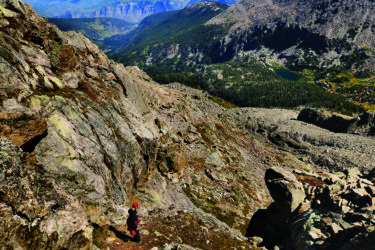The Local newsletter is your free, daily guide to life in Colorado. For locals, by locals.
On February 16, 2020, Emily Holland decided she was finally done drinking. The writer and podcast producer had recently moved to Boulder from Boston to be closer to nature, and, after a decadelong abusive relationship with alcohol, realized that booze was only holding her back. Holland, now 29, also understood that her desires to get sober and be outside were connected. She just wasn’t sure how. To find the answer, she launched the Nature Untold podcast in January 2021 to explore the intersection between addiction, recovery, and the outdoors through interviews with folks from across the adventure community. With its second season dropping on June 15, we spoke with Holland about the show and what she’s learned from it along the way.
5280: How did your relationship with alcohol change over the years?
Emily Holland: I don’t think anyone would have looked at me and said, “Oh, she has a drinking problem.” In the end, I really just felt like it was altering my mental state in a way that didn’t work with the life I was trying to build.
Addiction is often seen as monolithic, but your experience shows that people’s decisions to get sober don’t have to start at rock bottom.
Absolutely. A big part of the podcast is just representing way more types of addiction, sobriety, and recovery than we typically see. Everyone’s story is different.
What makes addiction in the outdoor community unique?
It’s a community where the question is always, “How do we make this more epic, more intense?” People rely on substances to do just that. Part of it is also how incredibly pervasive drinking is. It’s shown to us by alcohol companies as integral to the outdoor sports we do, so I’d say that outdoorsy people have more triggers to drink than a lot of other communities.
What kinds of challenges can that create for those trying to get or stay sober?
Outdoor folks have this ingrained idea of, “We finished the hard thing, we are going to go get a beer.” But the more times you don’t have a drink after your ride or run, the more opportunity there is for your brain to think, “These things are not linked, and that’s OK.”
Is that hard to do?
It doesn’t have to be. That type of thinking can help convince people they can’t stop drinking because of social repercussions.
What’s new for season two?
I want to let people share their stories anonymously going forward. That’s both for people who are worried about their reputations in the industry and for people who are early in their recoveries and aren’t ready to have their names out there. And I’ll also be delving into topics like how the eating disorder community’s experiences parallel the addiction community’s with some reported episodes.
Is there something special about exploring these subjects through a podcast?
It’s an opportunity for someone to tell their whole story in such a contextual, full way that we don’t often get in life. When I interviewed Paddy O’Connell, a freelance outdoor content creator in Carbondale, he mentioned some traumatic childhood experiences. When I thanked him for his willingness to share, he said something pretty profound: Every time he shares these events, they not only lose power over him, they help normalize these kinds of discussions.









